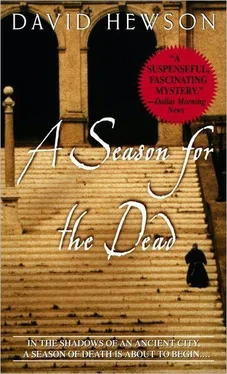David Hewson - A Season for the Dead
Здесь есть возможность читать онлайн «David Hewson - A Season for the Dead» весь текст электронной книги совершенно бесплатно (целиком полную версию без сокращений). В некоторых случаях можно слушать аудио, скачать через торрент в формате fb2 и присутствует краткое содержание. Жанр: Старинная литература, на английском языке. Описание произведения, (предисловие) а так же отзывы посетителей доступны на портале библиотеки ЛибКат.
- Название:A Season for the Dead
- Автор:
- Жанр:
- Год:неизвестен
- ISBN:нет данных
- Рейтинг книги:3 / 5. Голосов: 1
-
Избранное:Добавить в избранное
- Отзывы:
-
Ваша оценка:
- 60
- 1
- 2
- 3
- 4
- 5
A Season for the Dead: краткое содержание, описание и аннотация
Предлагаем к чтению аннотацию, описание, краткое содержание или предисловие (зависит от того, что написал сам автор книги «A Season for the Dead»). Если вы не нашли необходимую информацию о книге — напишите в комментариях, мы постараемся отыскать её.
A Season for the Dead — читать онлайн бесплатно полную книгу (весь текст) целиком
Ниже представлен текст книги, разбитый по страницам. Система сохранения места последней прочитанной страницы, позволяет с удобством читать онлайн бесплатно книгу «A Season for the Dead», без необходимости каждый раз заново искать на чём Вы остановились. Поставьте закладку, и сможете в любой момент перейти на страницу, на которой закончили чтение.
Интервал:
Закладка:
Costa very much wished to get out of this arrangement. “She’s got the hots for you, Uncle Luca. There can be no other explanation. I’d just cramp your style.”
The big man seemed offended. “Crazy Teresa’s not so bad-looking. A man could do worse.”
“I just don’t want to deflect attention away from you, me being young, slim and attractive and all.”
Rossi put out a big hand and patted him on the cheek, not so gently.
“It’s a new place in Testaccio. Caligula. Thirteen Alberoni. Eight o’clock. Don’t be late. I’m paying.”
“Great.”
Then Rossi was gone into the crowd, pushing his way through, exchanging a glance with one individual Costa thought he recognized.
Soon there’d be a beer around the corner, he guessed. Maybe there was something to talk about. It still seemed a slim option. He remembered Falcone and thought: Look for a simpler explanation. The big man just didn’t want to see Sara Farnese. That was all.
The idea seemed even crazier when she let him in to the second-floor apartment. She wore a dark-red cotton shirt and faded-blue designer jeans. Her hair was tied back at her nape. Her large and intelligent green eyes had a deep, shining luster that was new to him. She was about his height and just as slender. She moved with a controlled grace as if she thought everything through first.
The apartment was decorated with a degree of taste Costa associated with the wealthy middle-aged: reproduction wooden furniture, a polished dining table at the center, and paintings everywhere, landscapes, Renaissance portraits and some more modern, abstract works that still seemed to fit. The walls were covered with the kind of heavy wallpaper you saw in expensive hotels. And books, shelf upon shelf of books, all hardcovers, some leather-bound. There was no TV set, only a very pricey-looking stereo system and a pile of classical CDs next to it. None of this made sense to him. The designer jeans and her own magnetic looks apart, it was as if this woman—who could be no more than thirty—was living the life of a rich spinster in her fifties.
He gestured toward the crowd, now out of sight beyond the window.
“There are laws about harassment, you know. If you want me to do something, I can call the municipal police.”
She sat down in a stylish high armchair that looked uncomfortable.
“They’ll go away, won’t they? I still don’t understand what they want.”
They wanted to splash her beauty all over the front pages and say: Here’s the woman some university professor went crazy over, killing himself, his wife and her boyfriend, all for some approximation of love.
He fell into a low sofa feeling awkward and out of place in these surroundings. “They want your photograph.”
“Then they’ll have a long wait. I’m getting my groceries delivered. The man downstairs brings them to me. I’m not going back to the university until this nonsense is over. They can camp out there for a week if they like. They’ll still get nothing.”
That was easy to say, he thought. She didn’t understand how soon you wore down under this constant attention, and how that was all part of their game.
“You never told me your name.”
“Costa. Nic Costa.”
“What do you want, Mr. Costa?”
He pulled out a notebook. “Just some simple, basic paperwork. If that’s okay. Personal details.”
“Very well.”
In an efficient five minutes Sara Farnese told him all the bare facts.
She was twenty-seven, a little younger than he’d thought, held both Italian and English passports, thanks to the nationalities of her respective late parents, and was a middle-ranking professor at the university. Her affair with Stefano Rinaldi had lasted no more than a few weeks. She had not, as far as she was aware, mentioned Hugh Fairchild’s visit in Rinaldi’s earshot, although it was possible this had happened. Nor was she aware of Rinaldi’s money or drug problems, both of which came as some—genuine, Costa thought—surprise to her.
She cited from memory the source of the quotation about the blood of the martyrs but was unsure what relevance it had. Just for interest, Costa read her the full version of the doggerel about St. Ives as Falcone had explained it that morning.
“So it’s just a riddle?” she asked, bemused.
“You’re not reaching for a calculator.”
“Why would I? Isn’t the answer obvious? There’s one man going to St. Ives. The rest are going the other way.”
He began to understand Rossi’s discomfiture in the presence of this woman. She was too smart, too cool, too distanced. She made him feel small and stupid, not by any deliberate act on her part but simply from her presence, her way of speaking. This was, he thought, accidental. Some curious air of loneliness hung around her too and it was evident in this antiseptic, over-decorated place she called home.
“Did Professor Rinaldi know many people in the Vatican?”
“He knew the ones we all knew. The academics. The people who controlled access to the library.”
“You need a ticket to get in there, surely? Something that gets you through the private gates without having to queue with the tourists?”
She opened a small blue leather handbag that sat by the chair, one that was, like everything else in the room, too mature for her. Sara Farnese sifted through the contents and pulled out a laminated card.
It bore her name and photograph.
“Of course. The library has more sources on early Christianity than anywhere else in the world. That’s why I came to Rome.”
Costa looked closely at the card. “But this is for access to the Vatican itself. Not the library.”
“Sometimes,” she said a little hesitantly, “one needs to look at items that are stored elsewhere. This saves time.”
He didn’t know anyone outside Vatican staff who owned one of these things. “And Stefano had a card too?”
“I don’t think so. He was waiting for it to come through. Perhaps that’s why there was such a fuss when he forced his way in. If he’d had a card there would have been no problem.”
It made no sense. She had been at the university three years and owned one of these precious things. Rinaldi, who had been in the department for more than twenty, had to wait in line with the queues of Japanese.
“Why didn’t he have one? If it was essential?”
“I don’t know. I’m sorry. We worked in the same department but not on the same courses. Perhaps he felt it wasn’t so necessary. You can get a lot of material online these days. I prefer to look at the source. It feels more proper somehow.”
“Why wouldn’t he feel the same way?”
“I told you,” she replied a little testily, “I don’t know. I had a brief affair with the man. I wouldn’t claim I knew him terribly well.”
Yet Stefano Rinaldi felt he knew her well enough to try to commit suicide in front of her and rely on this woman… to do what? To save his wife somehow, in return for the death of her current lover?
A snatch of their conversation from the previous day came back to him.
“Ms. Farnese. You said that he spoke in two different voices to you.”
She had forgotten that part. It was obvious in her face, and the return of the memory puzzled her.
“That’s correct. When Stefano quoted Tertullian it was as if it were some kind of pronouncement, meant to be heard by everyone. It was loud, purposeful.” She thought carefully before going on. “It was much quieter when he spoke about Mary. Then he was just talking to me.”
Costa racked his brain for what that might mean. “Was there anyone else in the room that you knew? Apart from the guard who shot him?”
“No. They were all strangers.”
“But if he said one thing in a loud voice and the next more softly there had to be a reason. As if someone was watching, someone who needed to hear the first part, and to miss the second. Please. Try to think. Is that possible?”
Читать дальшеИнтервал:
Закладка:
Похожие книги на «A Season for the Dead»
Представляем Вашему вниманию похожие книги на «A Season for the Dead» списком для выбора. Мы отобрали схожую по названию и смыслу литературу в надежде предоставить читателям больше вариантов отыскать новые, интересные, ещё непрочитанные произведения.
Обсуждение, отзывы о книге «A Season for the Dead» и просто собственные мнения читателей. Оставьте ваши комментарии, напишите, что Вы думаете о произведении, его смысле или главных героях. Укажите что конкретно понравилось, а что нет, и почему Вы так считаете.












